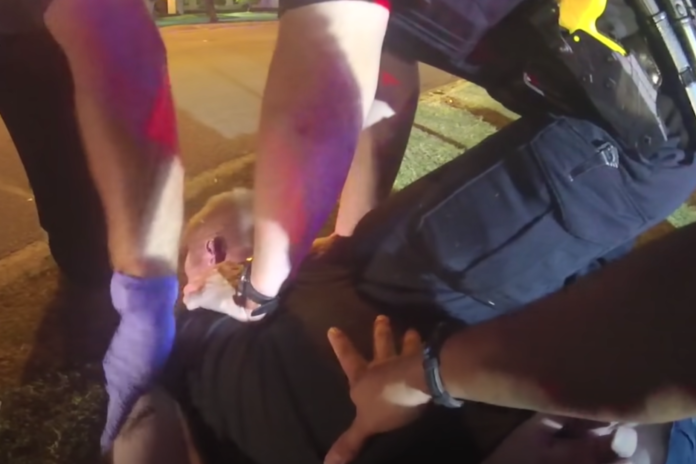
His name was Tony Timpa — but hardly anybody remembers that.
On an August night in 2016 Timpa dialed 911. He told the dispatcher that he had stopped taking his prescribed schizophrenia medication and recently ingested cocaine. He said he was scared, felt “unsafe,” and needed help.
Officers found the man unarmed, already restrained by a security guard’s handcuffs and in a state of confusion. They proceeded to handcuff him again, zip tie his legs together and kneel on his back for more than 13 minutes, cracking jokes until he died, begging for mercy.
In early July 2020, a federal judge tossed Timpa’s case aside as riots raged across the country in the wake of George Floyd’s similar death at the hands of police.
The judge’s decision did not even contest the medical examiner’s finding that Timpa died as a result of “the toxic effects of cocaine and physiologic stress associated with physical restraint.” Rather, it relied on the controversial doctrine of qualified immunity to excuse the actions of the five police officers involved, according to the Cato Institute.
None of the officers were removed from the Dallas police force. Four are on the service to this day and one has retired at the age of 50.
The Dallas Morning News published a curated version of one officer’s body-camera footage (found below) that summarizes the events leading to Timpa’s death. A raw version of the footage shows Timpa crying out, gasping for air, pleading for help, dying and laying in the back of an ambulance as paramedics try to revive him.
“You’re gonna kill me! You’re gonna kill me! You’re gonna kill me!” Timpa can be heard exclaiming in the video.
Meanwhile, officers are apparently unsympathetic to his plight. One cop jokes that Timpa needs a “Green Oaks cocktail special,” a reference to the sedatives used at a local psychiatric facility. Eventually, an EMT can be seen injecting Timpa with a sedative after he loses consciousness.
Around the time Timpa loses consciousness, his ear appears blue, a hallmark sign of oxygen deprivation, but the coloring also could have been due to flashing lights.
Timpa eventually loses consciousness with his nose and mouth pressed into the dirt. One officer says he can hear Timpa snoring and infers that he must be asleep. Many have postulated that this sound was in fact what’s known as a “death rattle,” a snoring-like noise which is commonly heard when “death is very near” and “the body has begun to shut down,” according to Very Well Health.
After this sound is heard, the officers begin to laugh. “Tony, time for school,” one cop says, jokingly trying to wake him up. “Five more minutes, mom,” another responds, mocking Timpa, who is likely dead at this point in the video.
“First day of school, I made breakfast, scrambled eggs, your favorite,” one cop says, evoking laughter from the others.
The officers later admitted that they were intentionally mocking the unconscious Timpa. “You know, it was kind of like relieving stress,” one said during a court hearing.
The jokes kept rolling even after Timpa’s body was loaded into an ambulance.
“Hope I didn’t kill him,” one officer says in the video while his colleague can be seen wearing a wide smile at the right of the frame.
“We ain’t friends,” another responds, jokingly distancing himself from the killing. This draws laughter from what sounds like at least three of the cops.
Timpa’s passing did not enjoy significant media attention. The Dallas Morning News followed the story closely, but it hardly received any play at the national level. Some believe this lack of attention is due to the fact that Timpa was white and his death, therefore, is not useful to the dominant narrative that police, motivated by racism, target and kill blacks.
As of publication, a petition requesting “justice for Tony Timpa” has received less than 16,000 signatures; a similar petition for George Floyd gained roughly 20 million.
















